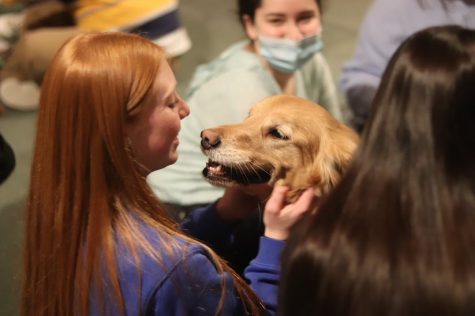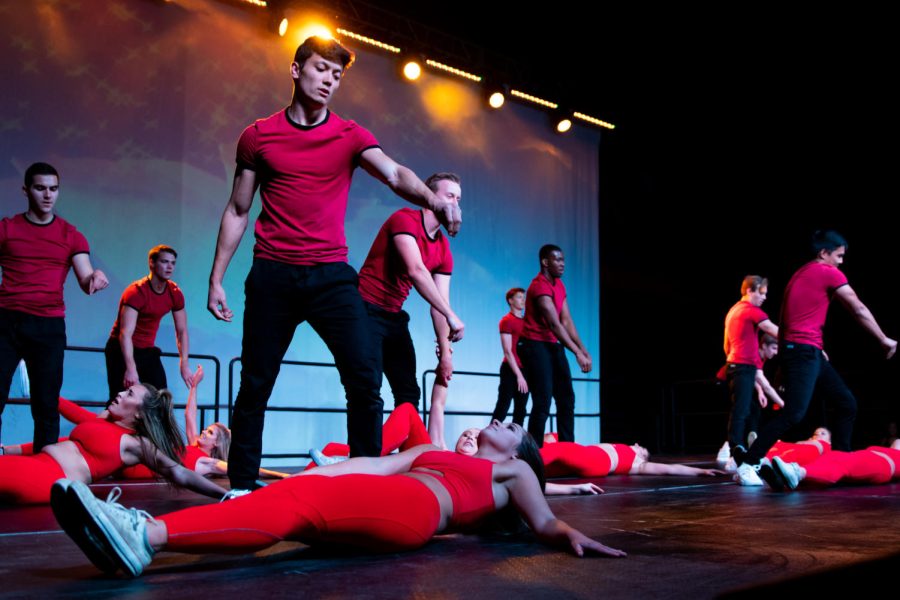‘Simply fun’: Students find interests, friends with Pitt’s more than 400 clubs
Dancers perform an excerpt from the ballet “Coppelia” during the ballet club’s spring show in Bellefield Hall.
August 25, 2022
A new semester means a new opportunity to join Pitt’s more than 400 student organizations — anything from club sports to Knittsburgh, a knitting and crochet group.
With so many clubs on campus, students might find it hard to learn about them all and decide which ones to join. Pitt’s Student Organization Resource Center facilitates registration, manages business transactions and provides resources such as event planning and training. SORC is also hosting its annual activities fair on Aug. 28 outside the William Pitt Union from 12 p.m. to 2 p.m. and from 4 p.m. and 6 p.m. so students can find clubs that interest them.
For students interested in dancing, the Ballet Club at Pitt performs twice a year and offers a weekly masterclass for different dance styles and levels. Members performing in upcoming shows attend weekly rehearsals with a student choreographer.
Leah Mrozek, a senior marketing and supply chain management major and the club’s artistic vice president, said the club is for dancers, or those interested in dancing, who want to continue performing in college.
“To join the club, you must fill out a form at the beginning of the semester to let us know about your dance experience,” Mrozek said. “The next step is to attend no-cut auditions so we can place each dancer in a piece. Join our email list to get the latest updates from the club!”
Mrozek said the club will host a kickoff meeting at the beginning of the semester, along with a technical rehearsal and dress rehearsal later in the semester. An added perk, she said, is that club members can attend shows by the Pittsburgh Ballet Theater for a discounted price.
Pitt also has a variety of clubs for students looking to volunteer. Pitt Best Buddies, a chapter of a global nonprofit organization, pairs students with members of the Pittsburgh community with intellectual and developmental disabilities for one-on-one friendships. They also host events like trips to the Pittsburgh Zoo & PPG Aquarium and participate in fundraisers like the Best Buddies Friendship Walk.
“Its main goal is to be inclusive. Pitt Best Buddies holds meetings at least once a month, and students can get involved by visiting our Instagram and emailing us to be put on the email list,” said Maddie Kuzdzal, a junior biology major and vice president of the group.
Camp Kesem helps support Pittsburgh families with cancer patients through fundraising, outreach and volunteering. Pitt’s chapter also hosts a weeklong free summer camp for children.
Lauren Charlon, a senior neuroscience major and the club’s co-director, said general body members meet every two weeks. She said the coordinator board also is currently accepting applications for various committees.
Therapy Dogs, a new club at Pitt, raises money and resources for the Humane Animal Rescue of Pittsburgh and strives to be a place where all dog lovers can meet and connect. They also advocate for the continuation of Therapy Dog Tuesdays, when therapy dogs from the Western Pennsylvania Humane Society stop by the Cathedral of Learning at 7 p.m. to visit with students.

(Patrick Cavanagh | Senior Staff Photographer )
“As a new club, we are testing out the frequency of meetings that work best for us. As of now, we are hoping to meet at least once a month. In these meetings, we plan to discuss our upcoming events that may include anything from service to fundraising opportunities,” said Omkar Betsur, a junior biology major and the club’s president.
There are also groups that are more oriented to specific majors, such as the Computer Science club. The computer science club hosts socials and informational events to connect students with each other and industry professionals. They also host workshop events to assist students with assignments, resumes and applications.
Jamir Grier, a junior computer science major and club president, said prospective club members don’t have to be a computer science major or pay dues to join. He said meetings are typically held on Wednesdays, while corporate events are held on Mondays. Hackathons are occasionally held on the weekends or over a span of time.
“CSC aims to be the largest CS organization on campus and has seized that goal by working hard to guarantee that the merit of our events, programs and avenues of communication (i.e., discord, newsletter) are good enough to drive members to participate when and how they can,” he said.
And if students can’t find a club that fits their interests, they can form one if they have 10 students willing to join the group and can secure a full-time faculty or staff member as an advisor. The new organization registration period occurs from Oct. 1-15 and Feb. 1-15.
No matter what type of club a student joins, Barbara Kucinski, a lecturer and faculty advisor at Pitt’s psychology department, said they offer friendship and spaces to figure out your interests with a diverse group of people.
“Student organizations are a good place for students to develop and hone communication and listening skills, engage with a diverse group of people and make friends,” Kucinski said.
“I’ve known students who got internships, jobs and volunteer positions by attending group meetings and meeting people,” she added. “Those that go on to hold leadership positions in a club/organization learn how to work with a team (which employers value) and gain leadership and management skills. Furthermore, it is simply fun.”








